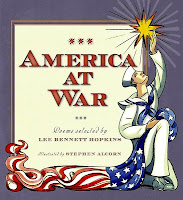America At War
Hopkins, Lee Bennett. 2008. AMERICA AT WAR. Ill. by Stephen Alcorn. New York: Margaret K. McElderry Books. ISBN 978-1-4169-1832-5
Review:
AMERICA AT WAR is a collection of 54 poems. As the introduction tells us, though, this book is not about war, rather it is about the poetry of war. Each poem was selected by Lee Bennett Hopkins for its emotional impact. AMERICA AT WAR is divided into eight sections: The American Revolution, The Civil War, World War I, World War II, Korean War, Vietnam War, Persian Gulf War, and finally, the Iraq War. The book ends with a vocabulary lesson for us all. Poet Ann Wagner shows us how, with carefully chosen, politically correct words, we can detach ourselves from the atrocities of war.
Each section begins with a quote from a poet, philosopher, or military leader and a brief commentary on that particular war. Many different emotions are found in these poems, including a young soldier who longs for his mother to tuck him into bed, a family who sings happy birthday to a photo of a father who is far from home, a sister who misses her brother and prays enemy forces miss him as well, and a father expressing his love for a newborn daughter he has never seen.
Throughout the book, illustrator Stephen Alcorn enhances the poems with his sometimes haunting watercolor artwork in muted colors.
AMERICA AT WAR is a collection of moving, heartfelt poems that provides many different perspectives on the effects of war and the toll it takes on men, women, and children everywhere. It reminds us that our freedom comes at an incredibly high price.
Highlighted Poem:
As I Do Now by Katie McAllister Weaver
We were told to take
only what was too important
to leave behind
Even frantic rantings
of our neighbors fleeing screams
couldn't help us decide.
The relentless threat of Nazis
muddled our every thought --
again,
a night like
KRISTALLNACHT!
We grabbed what we could carry.
Yet, eventually favorite photos,
stacks of books, mounting pile of memories
lined roadsides like gravestones
until all we had left were backpacks of food
and the weight of wishing
we could have brought more.
My small crystal turtle, though,
stashed under my shirt
reminded me how
I never needed it
as much as I do now.
Possible Uses:
Use "As I Do Now" to introduce a unit on The Holocaust.
Have students write a personal narrative describing things they would have wanted to take with them - what is "too important to leave behind".
Hopkins, Lee Bennett. 2008. AMERICA AT WAR. Ill. by Stephen Alcorn. New York: Margaret K. McElderry Books. ISBN 978-1-4169-1832-5
Review:
AMERICA AT WAR is a collection of 54 poems. As the introduction tells us, though, this book is not about war, rather it is about the poetry of war. Each poem was selected by Lee Bennett Hopkins for its emotional impact. AMERICA AT WAR is divided into eight sections: The American Revolution, The Civil War, World War I, World War II, Korean War, Vietnam War, Persian Gulf War, and finally, the Iraq War. The book ends with a vocabulary lesson for us all. Poet Ann Wagner shows us how, with carefully chosen, politically correct words, we can detach ourselves from the atrocities of war.
Each section begins with a quote from a poet, philosopher, or military leader and a brief commentary on that particular war. Many different emotions are found in these poems, including a young soldier who longs for his mother to tuck him into bed, a family who sings happy birthday to a photo of a father who is far from home, a sister who misses her brother and prays enemy forces miss him as well, and a father expressing his love for a newborn daughter he has never seen.
Throughout the book, illustrator Stephen Alcorn enhances the poems with his sometimes haunting watercolor artwork in muted colors.
AMERICA AT WAR is a collection of moving, heartfelt poems that provides many different perspectives on the effects of war and the toll it takes on men, women, and children everywhere. It reminds us that our freedom comes at an incredibly high price.
Highlighted Poem:
As I Do Now by Katie McAllister Weaver
We were told to take
only what was too important
to leave behind
Even frantic rantings
of our neighbors fleeing screams
couldn't help us decide.
The relentless threat of Nazis
muddled our every thought --
again,
a night like
KRISTALLNACHT!
We grabbed what we could carry.
Yet, eventually favorite photos,
stacks of books, mounting pile of memories
lined roadsides like gravestones
until all we had left were backpacks of food
and the weight of wishing
we could have brought more.
My small crystal turtle, though,
stashed under my shirt
reminded me how
I never needed it
as much as I do now.
Possible Uses:
Use "As I Do Now" to introduce a unit on The Holocaust.
Have students write a personal narrative describing things they would have wanted to take with them - what is "too important to leave behind".

No comments:
Post a Comment